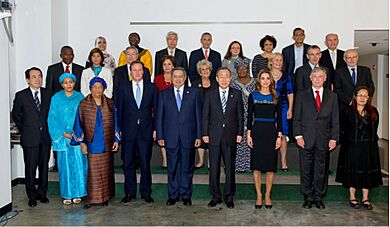Horst Köhler facts for kids
Quick facts for kids
Horst Köhler
|
|
|---|---|
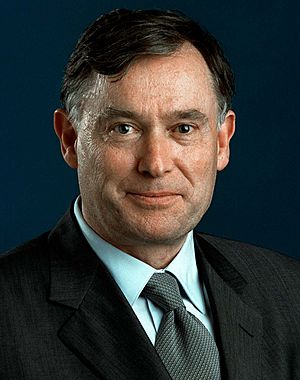
Köhler in 2004
|
|
| President of Germany | |
| In office 1 July 2004 – 31 May 2010 |
|
| Chancellor | Gerhard Schröder Angela Merkel |
| Preceded by | Johannes Rau |
| Succeeded by | Jens Böhrnsen (acting) Christian Wulff |
| Managing Director of the International Monetary Fund | |
| In office 1 May 2000 – 4 March 2004 |
|
| First Deputy | Stanley Fischer Anne Osborn Krueger |
| Preceded by | Michel Camdessus |
| Succeeded by | Rodrigo Rato |
| President of the European Bank for Reconstruction and Development | |
| In office September 1998 – April 2000 |
|
| Preceded by | Jacques de Larosière |
| Succeeded by | Jean Lemierre |
| President of the German Savings Banks Association | |
| In office 1993–1998 |
|
| Preceded by | Helmut Geiger |
| Succeeded by | Dietrich H. Hoppenstedt |
| State Secretary in the Ministry of Finance | |
| In office 1990–1993 Serving with Peter Klemm, Franz-Christoph Zeitler
|
|
| Chancellor | Helmut Kohl |
| Minister | Theo Waigel |
| Preceded by | Hans Tietmeyer (1989) |
| Succeeded by | Gert Haller |
| Personal details | |
| Born | 22 February 1943 Heidenstein, General Government (now Skierbieszów, Poland) |
| Died | 1 February 2025 (aged 81) Berlin, Germany |
| Political party | Christian Democratic Union (1981–2025) |
| Spouse |
Eva Bohnet
(m. 1969) |
| Children | 2 |
| Education | University of Tübingen |
| Signature | |
Horst Köhler (born February 22, 1943 – died February 1, 2025) was a German politician. He served as the President of Germany from 2004 to 2010. The President in Germany has a role that is mostly about ceremonies and representing the country.
Before becoming president, Köhler was an economist. He had an important career in government and banking. He led the European Bank for Reconstruction and Development from 1998 to 2000. He also headed the International Monetary Fund (IMF) from 2000 to 2004.
Contents
Early Life and Education
A Refugee Childhood
Horst Köhler was born on February 22, 1943, in a place called Skierbieszów. This area was in German-occupied Poland at the time. His parents were Bessarabian Germans from what is now Moldova. They had to leave their home in 1940 because of World War II.
The Köhler family moved to Poland, then fled again to Leipzig in 1944. In 1953, they left East Germany to escape the communist government. They lived in refugee camps until 1957, when they settled in Ludwigsburg. So, Horst Köhler spent much of his childhood as a refugee.
School and Military Service
A teacher encouraged Köhler to attend a Gymnasium, which is a type of high school. He graduated in 1963. After school, he served two years in the military. He then studied economics and political science at the University of Tübingen. He earned his doctorate there.
Career in Public Service
Working for the Government
Köhler started working for the German government in 1976. He joined the Federal Ministry of Economics. In 1981, he worked for the state government of Schleswig-Holstein.
In 1982, he moved to the Federal Ministry of Finance. He became a top official there, dealing with financial policy.
Key Role in German History
From 1990 to 1993, Köhler was a Secretary of State in the Finance Ministry. This meant he was a very senior leader. He helped Chancellor Helmut Kohl prepare for important international meetings.
He played a big part in two major events:
- The German–German monetary union: This was when East and West Germany joined their money systems.
- The Maastricht Treaty: This agreement led to the creation of the euro, Europe's single currency.
Köhler also helped manage the sale of state-owned businesses in East Germany after the country reunited.
Leading International Banks
European Bank for Reconstruction and Development
From 1993 to 1998, Köhler was president of the German Savings Banks Association. In 1998, he became president of the European Bank for Reconstruction and Development (EBRD) in London. The EBRD helps countries in Eastern Europe and Central Asia develop their economies. When he took over, the bank was facing financial problems. He worked to improve its investment policies.
International Monetary Fund (IMF) Leader
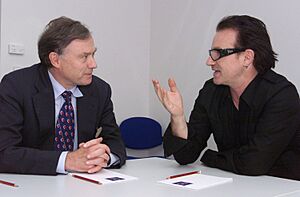
In 2000, Köhler was chosen to lead the International Monetary Fund (IMF). The IMF is an organization that works to make the global economy stable. It helps countries with financial problems.
One of his first actions was to work with British finance minister Gordon Brown. They discussed how to help poorer countries by reducing their debts. Köhler wanted the IMF to focus on big economic issues and work closely with the World Bank. He left the IMF in 2004 to become a candidate for president of Germany.
President of Germany (2004–2010)
Election and First Term
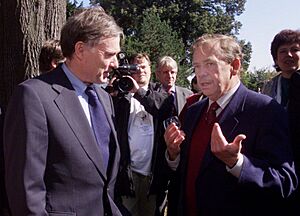
On March 4, 2004, Köhler was nominated to be Germany's president. He was elected on May 23, 2004, and started his five-year term on July 1, 2004. The German presidency is mostly a ceremonial role, but it holds a lot of moral influence.
Köhler was a popular president. He believed in being both patriotic and open to the world. He often spoke about Germany's place in the global economy. He also focused on how to create and keep jobs in Germany.
Focus on Africa
During his time as president, Köhler often spoke about foreign policy. He strongly supported helping to end poverty worldwide. He believed Europe had a duty to help Africa.
He worked hard to make Africa a top priority for Germany. He started the "Partnership with Africa" project. This brought together leaders, business people, and students from Africa and Europe. They aimed to create a fair partnership. Köhler was popular in Africa because he spoke honestly about issues like corruption.
Re-election and Resignation
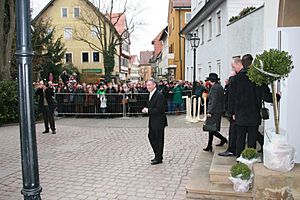
In 2009, Köhler was re-elected for a second term. However, he resigned on May 31, 2010. This happened after he made comments about Germany's military missions abroad. He suggested that military action could be needed to protect Germany's economic interests, like trade routes.
His comments caused a lot of discussion. Critics said he was going beyond his role as president. Köhler stated his comments were about fighting piracy. He resigned because he felt he did not have enough support in the disagreement. His resignation was a surprise to many.
Life After the Presidency
After leaving office, Köhler continued to share his views on important topics. These included relations between Europe and Africa, fighting global poverty, and climate change. He also spoke about the need for global teamwork.
From 2012 to 2013, Köhler was part of a United Nations group. This group helped plan global development goals for after 2015. These plans led to the 2030 Agenda for Sustainable Development.
In 2017, the UN Secretary-General appointed Köhler as a special envoy for Western Sahara. His job was to restart talks between Morocco and the Polisario Front about this disputed territory. He brought the parties together for talks in 2018. He left this role in 2019 due to health reasons.
Köhler also worked with many charities and non-profit groups. He was an honorary professor at the University of Tübingen.
Personal Life
In 1969, Horst Köhler married Eva Köhler. They had two children, Ulrike and Jochen. Köhler was a member of the Protestant Church in Germany. He enjoyed swimming, running, and cross-country skiing. He lived with his wife in Berlin and Chiemgau. Horst Köhler passed away in Berlin on February 1, 2025.
Honours and Awards
German Honours
 Order of Merit of Baden-Württemberg (2002)
Order of Merit of Baden-Württemberg (2002) Grand Cross Special Class of the Order of Merit of the Federal Republic of Germany (2004)
Grand Cross Special Class of the Order of Merit of the Federal Republic of Germany (2004)
International Honours
 Grand Decoration of Honour in Gold with Star for Services to the Republic of Austria (2003)
Grand Decoration of Honour in Gold with Star for Services to the Republic of Austria (2003) Order of Vytautas the Great with the Golden Chain (2005)
Order of Vytautas the Great with the Golden Chain (2005) Knight Grand Cross with Collar of the Order of Merit of the Italian Republic (2006)
Knight Grand Cross with Collar of the Order of Merit of the Italian Republic (2006) Grand Cross with Collar of the Order of the White Rose of Finland (2007)
Grand Cross with Collar of the Order of the White Rose of Finland (2007) Knight Grand Cross of the Order of the Netherlands Lion (2007)
Knight Grand Cross of the Order of the Netherlands Lion (2007) Grand Cross of the Order of St. Olav (2007)
Grand Cross of the Order of St. Olav (2007) Grand Collar of the Order of Prince Henry (2009)
Grand Collar of the Order of Prince Henry (2009)
Prizes and Awards
- The National German Sustainability Award (2014)
- Adam Smith Prize for Environmental Economic Policy (2014)
- CARE-Millenniumspreis (2015) for his work against poverty
- Global Economy Prize (2017)
See also
 In Spanish: Horst Köhler para niños
In Spanish: Horst Köhler para niños
 | William M. Jackson |
 | Juan E. Gilbert |
 | Neil deGrasse Tyson |


